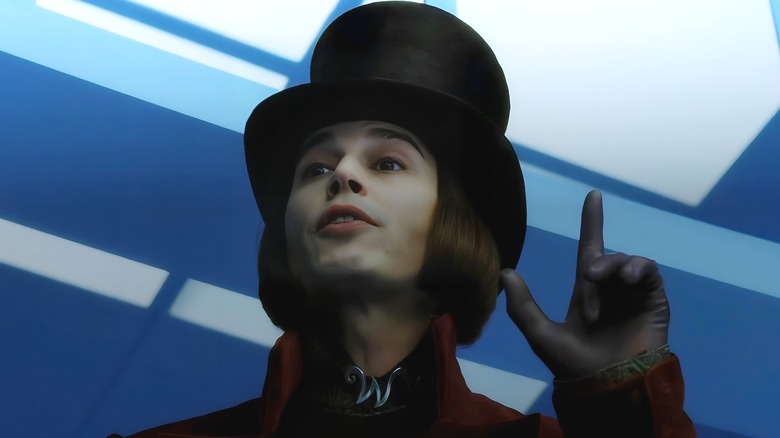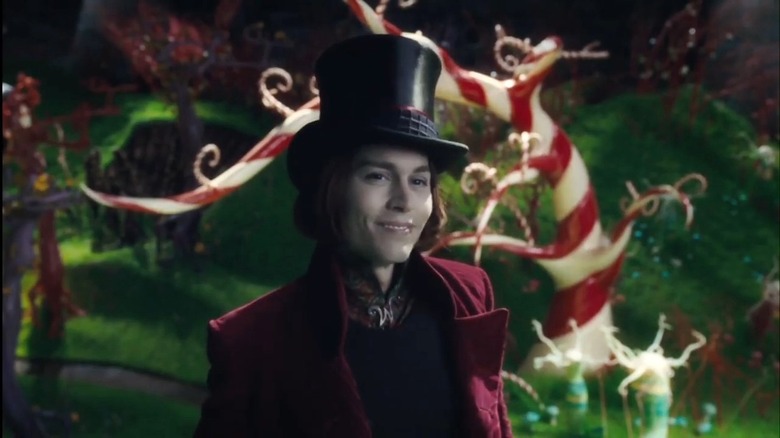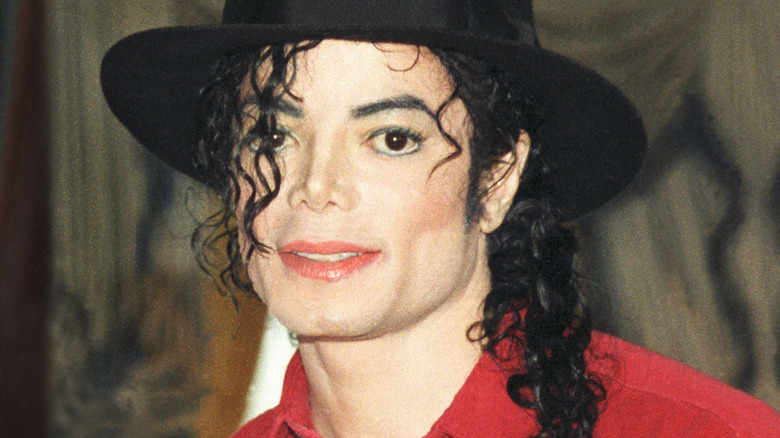The Inspiration Behind Johnny Depp's Willy Wonka
Fans worldwide remember Gene Wilder as the eponymous chocolatier in the 1971 family film classic "Willy Wonka & the Chocolate Factory," and the character is set to return in December 2023 with "Chocolate Factory" prequel "Wonka," starring Timothée Chalamet in the title role. Sandwiched in between those two actors, however, is Johnny Depp as Wonka in the 2005 hit "Charlie and the Chocolate Factory," where the iconic actor brought a decidedly different spin to the character than his predecessor. While a big hit at the domestic and international box office, the remake had one major detractor — Wilder — who called the remake more of an insult than an homage.
Directed by Tim Burton, "Charlie and the Chocolate Factory" also stars Freddie Highmore as Charlie Bucket, the unsuspecting future heir to Wonka's candy empire. Depp told reporters in a 2005 press gathering attended by IGN that his irreverent interpretation of author Roald Dahl's famed literary character was rooted in his memories as a little kid watching children's shows and their hosts.
"Guys that I watched like Captain Kangaroo and Mr. Rogers and Uncle Al [the Kiddie's Pal from NBC-TV's variety show "Laugh-In"] became that main part of the ingredient," Depp shared. "And game show hosts that I remember seeing and watching and thinking, "My God! They can't be like that at home. They can't actually be like that." Which sort of led me to believe that they put on a mask to get that all-important positive smile. So, that was the other side of Wonka."
Depp says the way the children's shows hosts spoke was 'super bizarre'
In addition to the look and smile of the children's show hosts that influenced Johnny Depp in his turn as Willy Wonka in "Charlie and the Chocolate Factory," the actor noted how the hosts spoke on their programs stood out to him as a young child.
"I distinctly remember, even at that age, their speech pattern and their kind of musical quality of the way they're speaking to the camera, to the children," Depp recalled at the event attended by IGN. "I thought, even then, it was really strange. I thought it was super bizarre because it was all, "Hello, children. How are you?" You know, that kind of thing."
Johnny Depp's best movie roles often include the actor in elaborate costumes, from his turns in "Edward Scissorhands" and "The Pirates of the Caribbean" films to "Sleepy Hollow," "Alice in Wonderland," and "Sweeney Todd: The Demon Barber of Fleet Street." Sometimes, as in the case of "Charlie and the Chocolate Factory," not only did his costume help inform Depp's role, but the veneers he used to flash Wonka's pearly white smile changed the way he looked.
"It was incredibly important to have a feel for it and to be able to put that costume on and click those veneers into my mouth and the teeth, which actually changed the shape of my face a little bit," Depp told reporters at the press gathering.
Depp says his Wonka acting had nothing to do with the King of Pop
It didn't take people long to start comparing Johnny Depp's performance in "Charlie and the Chocolate Factory, to that of other real-life individuals, specifically the King of Pop, Michael Jackson. At the aforementioned press event, Depp told reporters that the Jackson comparison didn't bother him, noting with a laugh, "Everybody's entitled to think what they want, even while being violently wrong."
Truth be told, Depp added, it never occurred to him once during the production of the film that his interpretation of Jackson had any connection at all. "It never entered my mind," he said. "I still don't quite understand it. I guess I can on one level because of the make-up and the children and the fantasyland kind of thing. But it seems weird to me."
Depp did note during the presser, however, that if there was any specific person that he could compare his turn as Wonka to, it would have to be almost somebody like legendary billionaire industrialist Howard Hughes, whom the actor described as a "reclusive, [a] germaphobe, [and] controlling."


